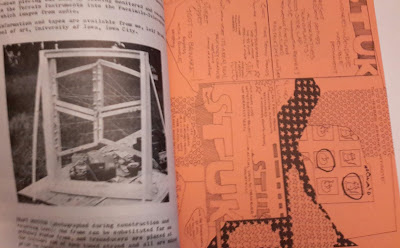' "If you don't turn on to something," one contributor noted, "all you have to do is turn the page." Such blatant chaos marked Assembling as a counter-book or anti-book (though not a "non-book") which nonetheless gains its cohering definition (which is approximately repeatable) from its unprecedented diversity. In my admittedly biased opinion, more than half of the material has been uncommonly interesting, while a few contributions are awesomely extraordinary. It is more important to judge that very few pieces, if any, would have otherwise gotten beyond private musing into public print.' - Richard Kostelanetz
The Assembling project ran from 1970 to 1983 (13 issues)...an open invite for anyone to send 1,000 copies of their art, poetry, prose to the editors, who would then assemble and publish. I find it hard to believe that every contributor sent 1,000 copies but if not it would mean that some versions were unique and possibly varied in page count. One contributor who did make each copy of the book unique was writer Richard Meltzer, sending 'a thousand pages of all different shit'. In the one I bought recently, his contribution is a page torn from a glossy comic. On the subject of unique versions, mine also has a page onto which card and paper are glued (loosely). See the photo at the bottom, the only one that isn't mine but was taken by the dealer I bought it from.
Ed Ruscha's pages were also unique, each one hand-stained, a sample of which was on view at the recent De La Warr Pavilion show, Towards an alternative history of graphic design: Schmuck, POP, bRIAN, Assembling, which I featured here. But let's not be too impressed with big-hitters like Ruscha, the point being that the 'unknown' are what made this magazine (which doesn't stop me being chuffed at having an issue containing a page sent by Meltzer, a writer I greatly admire).
Today we consider small press publications to be part of the cultural scenery, but as the editors of Assembling clearly state, the scene in America at the time was hardly overflowing with outlets for this kind of thing. Yes, there's been an underground small press scene since the birth of zines, but most relied upon known fellow writers and artists. Assembling's idea of an open call, a free-for-all (except the copying cost) blows apart both notions of cutting-edge cliques and their inevitable editorial control. Consequently, the content varies greatly, one of the joys being not only the diversity of the creations, but also the paper they were copied onto. Sadly, most issues are expensive, but having this one in my hands it feels like every penny spent was worthwhile. I took these snaps because it can't be bent open for the scanner. You can read more about the project here.









No comments:
Post a Comment